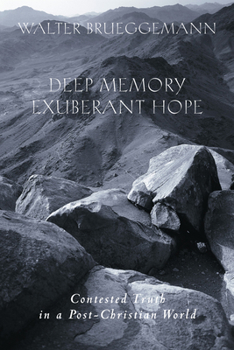Deep Memory Exuberant Hope
Select Format
Select Condition 
Book Overview
The leading Old Testament theologian reflects on the meaning of the gospel in today's world. These studies on a variety of biblical texts focus deftly on reading, listening to, and proclaiming the gospel in a broken, fragmented, and "post-Christendom" world. Brueggemann explores how these traditions have the potential to continually resonate in our contemporary communities and individual lives.
Format:Paperback
Language:English
ISBN:0800632370
ISBN13:9780800632373
Release Date:July 2000
Publisher:Fortress Press
Length:168 Pages
Weight:0.65 lbs.
Dimensions:0.4" x 6.0" x 9.1"
Customer Reviews
2 ratings
Another Magical Epiphany of God Present in the Text!
Published by Thriftbooks.com User , 21 years ago
After classes with the Master Teacher of Old Testament, I felt a need to dig around in his more recent essays: "The Role of Old Testament Theology in Old Testament Interpretation" ; "Preaching As Sub-version" ; Both his last and first essays!In his current lectures in Old Testament Theology, Bruegge has progressed from Reformation and Enlightenment through Barth, Eichrodt and von Rad bringing up his issues of historical criticism and post modernism...landing squarely on page 115 with his repeated description of Theo-ology is "speech about God." Then as he does often conclude lectures: It may be from another source can come an alternative to this dominant construal of reality, "perhaps from what Robert Bellah terms the 'republican' tradition... If we work from the ground-up it is entirely possible that lived reality reimagined from this Character (God) who lives on the lips of these witness could offer a wholesale and compelling alternative." This alternative world is clearly marked out in the first essay "Preaching as Sub-version"..."We say these things to one another because...the utterances mediate the Easter option" as possible, in our practice, imagined in public policy, stated again on pages 17, 25 and 49. My favorite essays land on the first, "Preaching as Sub-version" and the final two out of nine Jewels of distilled Brueggemann!One comment about Essay 8, "Crisis-Evoked, Crisis-Resolving Speech." "It is clear that OT Theology cannot effectively advance by focusing on conventional conceptual content in the text." In pointing out the "regresses" of Israel in times of crisis, YHWH both discloses and acknowledges the ways in which God fulfills, but also fails in his relationship to Israel. Here again as in most books and lectures, Bruegge gives the Hebrew words used in Exodus 34:6-7a ; Hosea 2:19-20 ; Isaiah 54:10: As hesed, rahum, hanun, and 'emeth. I always thank him for using the English spellings. Sincerely for both Bruce Day and Professor Bruegge.Retired Chaplain Fred W Hood
"we are in a deep dislocation in our society..."
Published by Thriftbooks.com User , 23 years ago
...so Brueggemann begins the 5th chapter of "Deep Memory..." This is the third book in a series focussed on using Old Testament scriptures to illuminate problems in our post-modern society. As in the previous two books, each chapter will appeal to different readers in diverse ways. Some are of mostly theological interest; some are more visceral. The theme explored in all of them is the similarity between the culture of Isreal in Exile (ca.587BCE)and our own shattered society 26 centuries later.both they and we can no longer trust the institutions or the God that defined and dominated our communities until very recently. Brueggemann says that "...denial and despair are powerfully at work to prevent any serious engagement of the crisis of dislocation into which we are now plunged." These lead to self-preoccupation and self indulgence, words that aptly describe the "winner-take-all" world I see around us today. The author asks us to return to the Exilic scriptures (Samuel, the Psalms and Isaiah are used as examples) to see what help we can draw from the Hebrew relationship with Yahweh. In the past we have often set aside some of these verses because they cause conflict and pain to our post-enlightenment sensabilities. Brueggemann argues that we need to wrestle with these also; there is much to be learned from exploring why they wound us so deeply. These texts would not have been passed on unless they were of importance to the identity of both Isreal and the Christian community. This testimony by a people in exile about their relationship with their God can give us language with which to confront the narcissistic, neighbor-sacrificing culture that surrounds us. A fair amount of attention is devoted to describing how our relationship with Yahweh has devolved since the Reformation (and later the Enlightenment), but the blame is spread evenly and not dwelled upon. Instead it provides a map with which to get back to the words and relationship we have lost and are desperate to recover. An alternative community, living in communion with God's steadfast-love, is the kingdom that all believers are called to. Dr. Brueggemann's final thoughts urge us to use Old Testament theology to turn away from the brutality of our self-centered society long enough to examine the possibilities of a deeper relationship with God.I found that reading the noted scripture texts in my own Bible greatly enhanced the meaning of each chapter and made this good devotional as well as educational reading.






